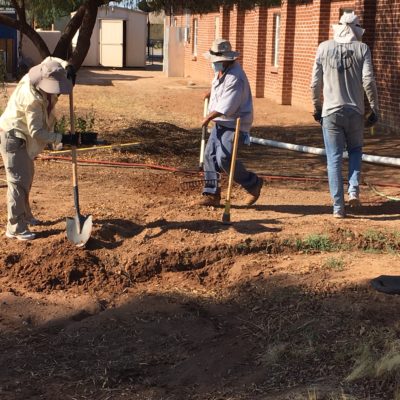Over the past six months, groups from six congregations have shared their thoughts on tending church land with Andrew Hudson. Andrew is a student at AMBS who has worked with Mennonite Creation Care Network and Mennonite Men’s Join Trees on a church lands theology project throughout the year. Andrew will present his findings and reflections in an MCCN webinar on Tuesday, May 10, 2022, 7:30 p.m. ET. Register here
Also see our resources on church land
The churches represented span the U.S. They included: Albuquerque Mennonite Church in New Mexico; Landisville Mennonite Church in Pennsylvania; Seattle Mennonite Church in Washington State; Taftsville Chapel Mennonite Fellowship in Vermont; and Waterford Mennonite Church and Eel River Community Church of the Brethren in Indiana. Each group had a long history with their land. Andrew glows when he talks about his experiences interviewing them.
“People who work with church land—the actual soil—have a lot of wisdom to share with the broader church. As we learn to do land acknowledgements and then keep going deeper, being aware of our own relationship with our land and place is increasingly important,” Andrew says.
What would Jesus say about weeds?
He has found that how to handle weeds is a topic many reflect deeply on, often without being fully conscious they are doing so. In New Mexico, Bermuda grass is a weed, choking out natives, but it keeps desertification at bay; what to do? In Vermont, a living mulch is a faithful practice while also requiring extra energy for the green team to communicate that it is a “good weed.” A group in Goshen, Ind., understands weeds to be ‘species out of place,’ and understands groundhogs in a garden in the same terms. These and many other insights from the interviews shed light on Jesus’ teachings that use weeds as key images.
“Jesus talked about weeds in ways that illustrated both the perspective of the weeds as well as that of the humans who struggled with them. His teaching raised questions about the negativity of thinking about plants as weeds, while also acknowledging the deep struggle we have to carve out a niche in creation. The churchfolk in these interviews have been holding that tension, and the wisdom they have to share can help us all discover the emerging gospel in our simplest church operations.”
Andrew is also preparing a bibliography that pulls together resources on church grounds in the following areas:
- Cemeteries
- Ecosystems
- Gardens
- Parking lots
- Permaculture
It will be posted on the MCCN website when completed. Those who sign up to attend on May 10 will be notified when it is available.
